#the existence of the place not necessarily the instance specifically
Text
au roulette #2: coffee shop
it's- well. there's a coffee shop. and it's an au. sure!
The stones of Minas Ithil are still new, fresh-cut from the quarries of the White Mountains and star-bright beneath the unhidden sun. The city is still young and incomplete, but shops still spring up on the lower levels, in the shadow of new walls, coffeehouses and bakeries and weavers’ shops. It’s here that Abrazâni meets Valardis.
The coffee shop has no name yet, unless it’s that of the proprietor, a young Númenórean with long hair braided back and some of the most ingenious combinations of flavors Abrazâni thinks have ever been put to coffee. The fact that she actually likes some of them is an even greater testament to Sildor’s skills.
“The city is coming along quite well,” Abrazâni says, watching her son vanish around the corner after Valardis’s. “It’s beautiful already.”
“It is,” Valardis says, nearly glowing with pride. “And far more swiftly than we expected.” She draws a heavy notebook from the satchel at her side and spreads it between them. “We have some early designs for the citadel,” she says, flipping through smudged and sketchy pages until she finds the one she seeks, rough drawings of a tall, proud tower decorated with images of the crescent moon. “I thought we might have a beacon at the top,” Valardis says, “like the ones in the great lighthouses. Estenan thought the light would surely disturb the city at night, but I think it would remind many of us of home.” And if she hesitates a little on the word, Abrazâni does not mention it, and does not try to decide the places she should now call home.
“It’s wonderful,” she says instead, reaching out but not daring to touch the page. She lets a teasing note into her voice. “You really are trying to live up to the moon theme, aren’t you?” And Valardis laughs, the bright sound echoing off the stone, and turns to another page.
“We called this place Ithilien,” she says. “We may as well commit to it.” She pulls a pencil from her hair, making a face as the bun wound round it unravels. “There is something else. Less grand than a palace, perhaps, but I think you may like this one better.” She spins her sketchbook round and pushes it towards Abrazâni, smiling expectantly.
These sketches are more careful, depicting long, high-roofed halls and great windows up above, and in some of the drawings they are filled with shelves, and the shelves with books. Abrazâni looks up. “A library?” Valardis’s smile widens.
“We will collect as much as we can of what remains of our lore, but it will want for a keeper sooner rather than later.”
Abrazâni studies her friend. “You don’t mean to fill the role yourself?”
“Ah, I’ve always been a better dreamer than a planner, you know that.”
“You sell yourself short,” Abrazâni murmurs, but she runs her fingertips gently over the arched windows in the pictures.
“I know my strengths,” Valardis says primly. “And besides, I will not lack for other duties. It would please us to have one who knows her business to keep the archives.” And Abrazâni smiles then, and accepts the offer gladly, and Valardis embraces her.
“Don’t tell me you designed this just for me,” Abrazâni says, turning through half a dozen pages of sketches and things that are very nearly architectural plans. It bears a great resemblance to the grand library of Andúnië where she had met often with Valardis and with Isildur and Anárion in more peaceful days.
“Then I will not tell you,” Valardis says easily. “Is there anything you would see changed?”
“Not at all,” Abrazâni says quickly. “Well. Not at the moment, anyway.” Valardis laughs.
“Make a list and we will see it done,” she says. Abrazâni quirks a smile.
“This was not your plan alone, was it?”
“As I said,” Valardis says serenely, “I am not the great planner in my household.”
“And Isildur is?” Abrazâni says, mostly under her breath. Mostly.
“Hey!” a new voice protests.
Isildur joins them in the coffee shop, dirt still dark under his nails as he kisses his wife and lifts Abrazâni in a spinning hug as he and his brother so often had when they were children, never mind her protests. The Tree is growing well, he reports, and asks after Abrazâni and Tárandil when the matter of the library is settled. Abrazâni quiets, and does not miss the look her old friends share, but in truth she and her son are doing well, all things considered, and he often misses Isildur and Valardis’s sons when he and Abrazâni are out of the city.
“Then stay, if you find Minas Ithil to your liking,” Isildur says, and she appreciates it, she does, and having such a great library as her charge calls to her as little else, but some days she is still the wife of the Captain-general of the fleets of Númenor, and many have not forgotten that. Neither has she.
But if ever there was a time for new beginnings, this must be it, with the end of something great and from its shards building that which must come next.
“Perhaps I will,” she says.
#auroulette2023#lotro#my stories#playing with thoughts about what abrazani's dynamic with everyone actually was#(it spawned a lot of timeline of their relationships thoughts that did not end up here)#abrazani#valardis#isildur#the other thing about this au where she's here is that i don't think it changes all that much re:the disaster and related Things#there might be slightly fewer issues specifically about 'son of no blood' but. then again there may not be. just different ones#but yeah i don't think it fundamentally changes anything except maybe making halls of black lore sadder#the existence of the place not necessarily the instance specifically#anyway :)#edit: asdfd this was another travel one and. among the things that were not checked was how far apart any of isildur's kids were born
3 notes
·
View notes
Text
With all the age discourse around Spider-Man Noir right now, I thought I’d compile parts of the comic that imply his age. I want to state that this pulling from his 2009-2010 comic run before the time skip, specifically the first volume. The spiderverse movie has taken a lot of liberties with the characters, so it is very possible that what Peters age is in 1933 in the comics is NOT what his age is in 1933 in the movies.
Peter’s age is not directly stated in his 1st comic run (I can’t speak for the 2020 ones because it has been a while since I read them, plus there’s like a 10 year jump). It IS however heavily implied that he is young. So much so that you can’t seem to go more than a page without someone referencing it.
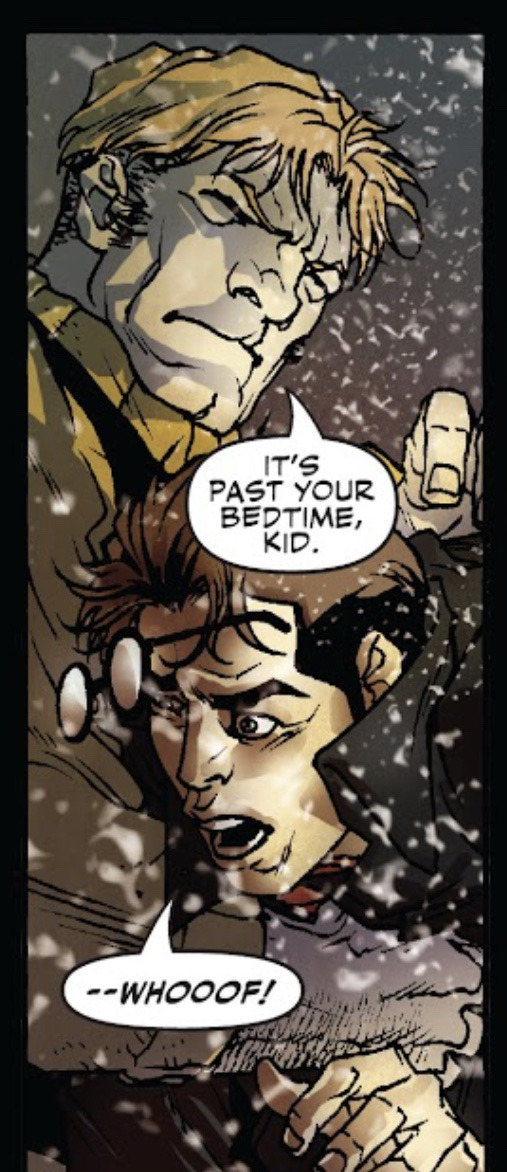
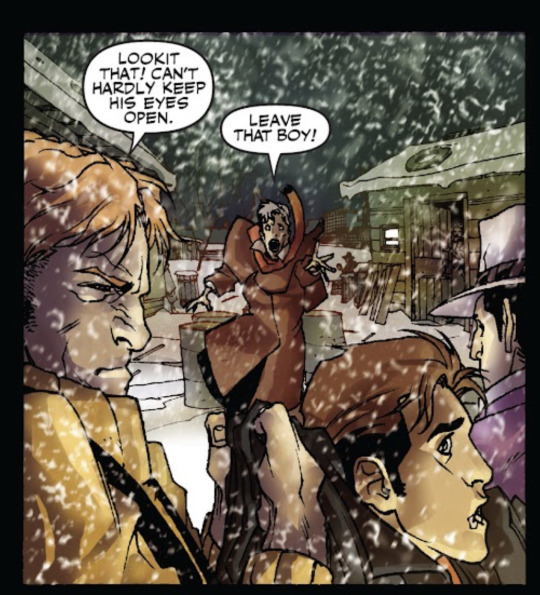
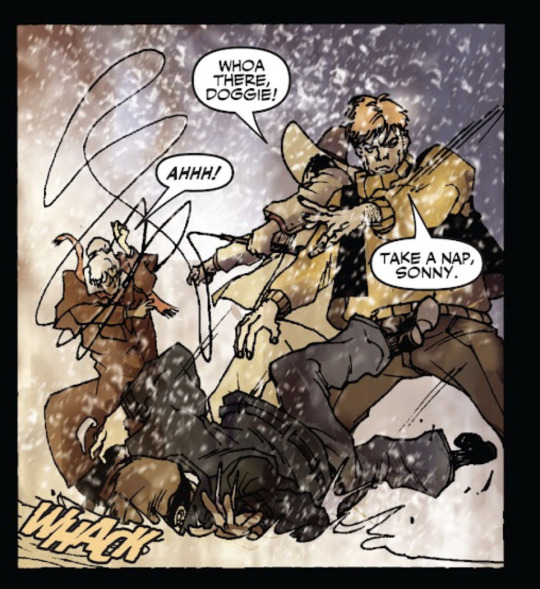
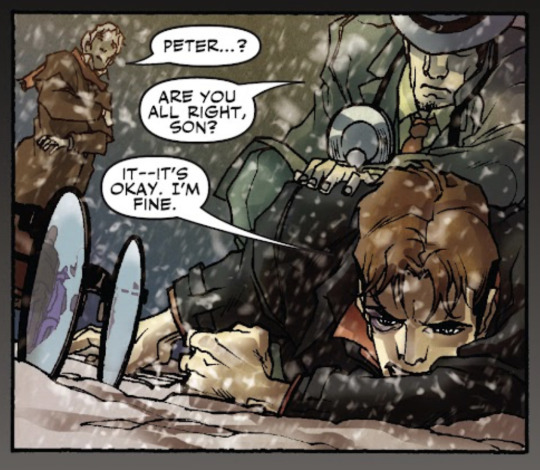
Like, these all happen in the same scene. The writers beat you over the head with it.
In this issue alone Peter is called both “son” and “sonny” once, “boy” twice, and “kid” 8 times. Outside nouns, he is also referred to as young, and when Urich brings him to The Black Cat, Felicia calls it “babysitting.” Urich also asks Peter if he is “allowed out after midnight” but after some research I can’t seem to find any evidence of NYC having juvenile curfews at this point in time, though they did exist in lots of towns in the late 1800s and early 1900s because of child labor laws. I think this instance is just Pete just being young and an adult being concerned about his well-being.
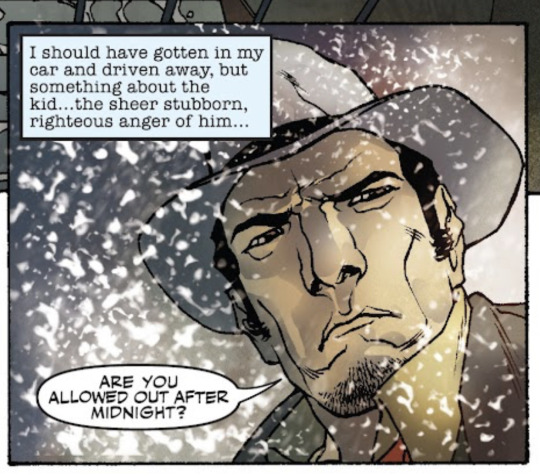
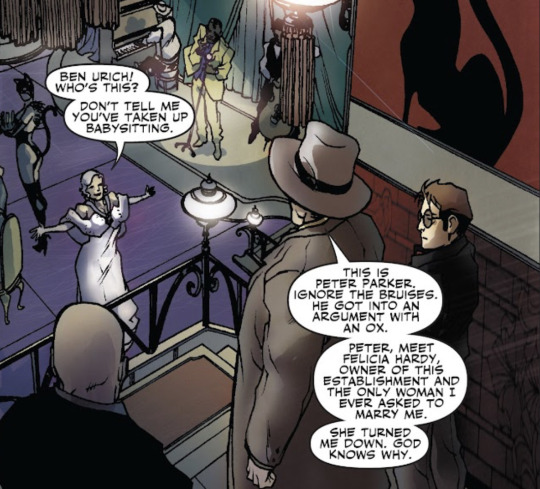
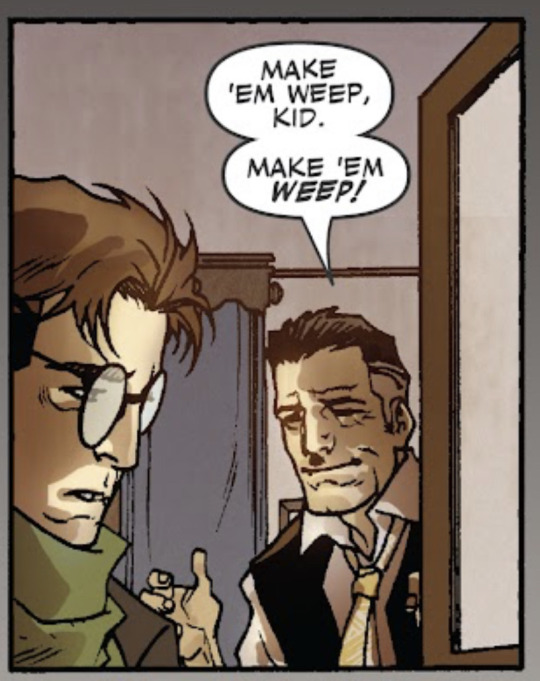
It is also mentioned in this volume, and again in Eyes Without a Face (vol 2), that Peter wants to go to college in the future and is currently studying & saving up money to do so. This alone doesn’t necessarily mean he’s under 18 as there isn’t a max age to apply for college, plus Peter comes from a poor family during the Great Depression. It wouldn’t surprise me if he started college later than usual because of that (lack of funds & catching up due to not being in school/working).
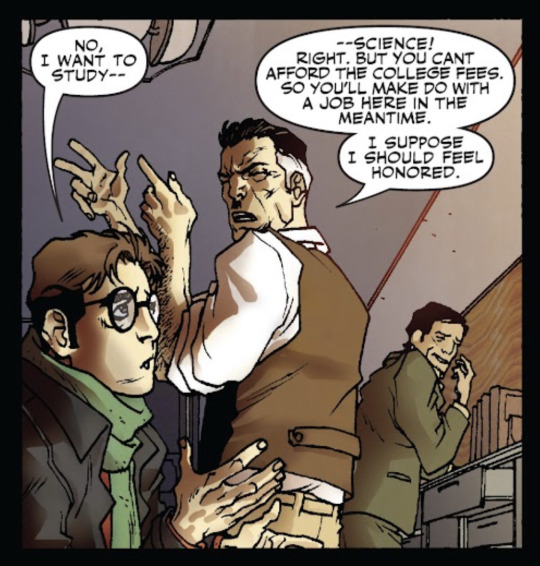
There is other evidence that does imply he is under 18 though— he’s too young to drink alcohol!
Spider-Man Noir Vol 1 issue 1 starts in January 1933 before jumping back three weeks to December 1932 where Ben Urich meets Peter Parker
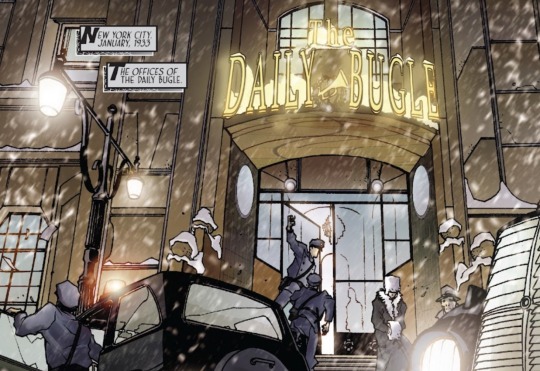
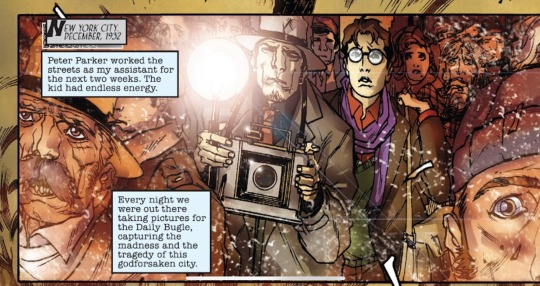
It is during December 1932 that he meets Felicia Hardy who owns the speakeasy The Black Cat. Prohibition is still in place and won’t be overwritten until a year later in December 1933. It is important to note that before Prohibition was instated, the drinking age in New York was 18 years old. That law is what the characters reference when they discuss drinking age. And most importantly, Peter doesn’t deny the fact that he’s too young to drink. He just snarks back in true Parker fashion
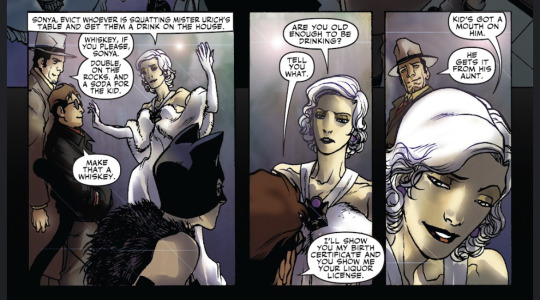
This is the most concrete evidence there is towards Peter being under 18 in the noirverse. It can even be argued that Peter is under 17 with how easily Felicia picks up on the fact that he’s underage (and that she does so from a distance might I add, as seen in the ‘babysitting’ panel).
There is also a panel where JJJ refers to Peter as an “orphan.” By definition, an orphan is a kid under 18. This is JJJ, so this can be taken with a grain of salt as he loves good ol hard-hitting words. When people speak they don’t always use words by their exact definitions; sometimes if you’re young and your parents are dead, JJJ is going to label you an orphan even if ur a legal adult lol. But if you take this at face value it’s definitely another indicator that Peter is under 18.
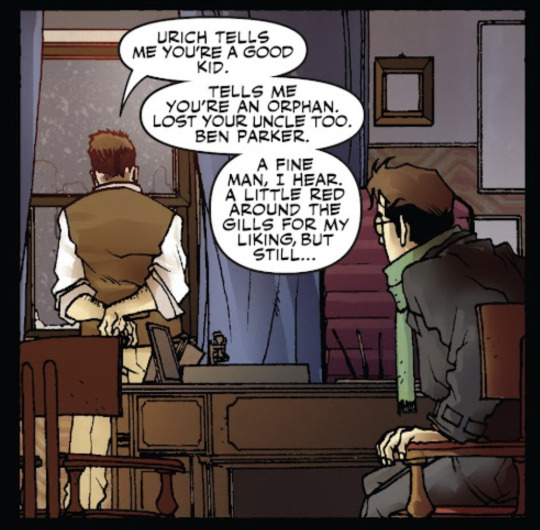
TLDR; Spider-Man Noir from his 2009-2010 comic run is most likely under 18, and can be argued to be 15-16+. If not that, then is definitely college aged or younger.
#Hoping praying the format is ok#Tumblr mobile is the death of me#Spider-Man noir#spiderman noir#spider noir#spiderverse#peter benjamin parker#hes just a little guy#ben urich#jj jameson#felicia hardy#Ok gn everyone#Snork memenemememee#If I wake up and the format is ass I’ll repost lol
506 notes
·
View notes
Text
The type of person who tends to complain about others making everything political, or analyzing the political aspect of things that are hegemonically considered non-political, often does it on the grounds that the person doing the politics is refusing to enjoy it or letting others enjoy it. And the vast majority of times this perspective on politics as something that makes anything unenjoyable or boring comes from a place of privilege*, the privilege of being able to ignore the political in favor of "purer" persoectives. The position that something can be non-political necessarily means implicitly accepting the legitimacy of the status-quo as the natural order of things, it's a loss of both historical and social perspectives.
Apoliticism, the eschewing of a political perspective, is not legitimate only when it is mutated from an individual instance of favoring other perspectives over the political into a systematic rejection of anything political. Nobody is saying that in every single instance of engagement with anything everyone should drop every other perspective in favor of the political one, but rather that the repudiation of the possibility of anything having a political backdrop and interpretation is the attitude that's illegitimate and which springs from privilege.
Taking tumblr as an example, the "hey man how's it going" and other memes in that vein (what are you smoking, is everything ok op?, let people enjoy things...) that some people like to condescendingly parade around whenever they encounter somebody applying political thought to the subject at hand, is only possible to the person writing these responses, if they have already internalized the position that politics is an isolated aspect of some elements within society and thought, that the status-quo is the natural order of things from which everything else sprouts, and since that status-quo is apolitical, adding politics into it is both a deliberate and optional choice.
If we're talking about media, which is the case in most of these situations, politics of course has permeated the logical pathways of the author, their implicit beliefs, and the context in which that piece of media is created and in which it evolves. Therefore there is an undeniable political dimension to both the textual and the metatextual, no matter how apparently innocent that piece of media may appear, or however strongly the author tried to bury the political under layers of innocence.
And the belief that "politicizing" something makes it less enjoyable or interesting also comes from the perception of politics as something reserved for the professionally political spheres, for the politicians, statesmen, and stuffy theorists. The truth is that politics are much more personal and relevant to the individual "average" citizen than what the liberal hegemony pretends. The chain of supply that brought your polyester clothing to your back, the development of the land on which your house (or lack thereof) stands, the way your education was administered, the text of the last book you read, the production of the ink with which it is printed, your relationship with your family, your overwhelming chance of having experienced some form of sexual assault if you're a woman, your "apoliticism" and existence itself, it is all saturated with politics. Acknowledging this and sometimes even exploring what that means is necessary for you as a social animal.
"Politicizing" something does not mean forcibly applying a political lens to it, it actually is picking a universal perspective and exploring how the subject interacts with the context in which it exists.
*privilege here meaning the material conditions that allow a person to ignore politics, and not necessarily the specific set of axis of privilege that may affect an individual, although these two things are not exclusive in the context of this post
#seriousposting#if this breaks like 500 notes watch the very type of person I'm talking about materialize in the notes
64 notes
·
View notes
Text
What is Hylics Canon? - The Accretion
Preamble/Disclaimer
Hi! This post will be a bit different from my previous analysis and theory posts. Unlike those, I'm going to be doing very little theorizing or speculating -- at least, that's not my primary goal. What I want to do today is go over everything we know about "The Accretion," a vague event referred to numerous times throughout Hylics 2. Additionally, I'll try to draw some conclusions about what I think is Mason's authorial intent with the Accretion. I'll do my best to walk through my logic and view multiple sides, and whenever I speculate or make a stretch I'll try and be clear about it.
Before we start, I want to apologize for if I come off as rude or dismissive of certain headcanons or interpretations. Later on I'll be tackling 3 of the main theories I've seen floated around and I intended to be critical and clear when I think they contradict the established canon. However, I do not mean to invalidate these interpretations. Hylics' lore is very interpretive and vague and "canon" isn't something that needs to be strictly abided to. If your interpretation conflicts with what I've shown here, that's perfectly ok!
Basically, my post is for people who either care about adhering to canon or are just curious as to what evidence there is. That being said, let's jump in!
The Basics
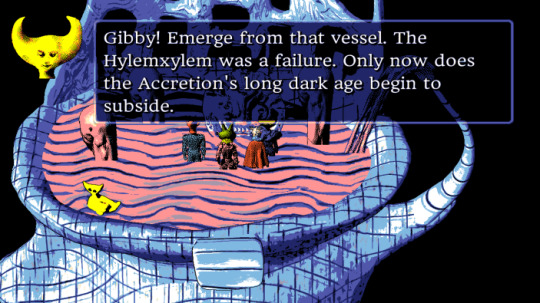
"Gibby! Emerge from that vessel. The Hylemxylem was a failure. Only now does the Accretion's long dark age begin to subside."
This dialogue, said by Wayne to Gibby before the final battle, is perhaps the only piece of required dialogue referencing the Accretion. This paints the Accretion as the cause of a "dark age," although it's unclear what this entails, which the Hylemxylem threatens to begin again. Many have taken this to indicate that the Hylemxylem caused the Accretion, but there isn't substantial evidence for or against this. It's certainly a valid possibility.
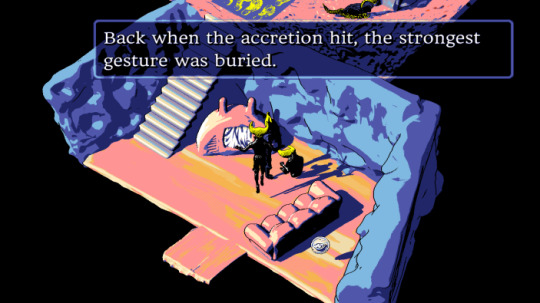
"Back when the accretion hit, the strongest gesture was buried."
This line, spoken by one of the Waynes at Waynehouse is one of many indications that the Accretion was an event. Many other pieces of dialogue have wording that confirms this, this is just the first the player is likely to encounter. I bring this up to dispel the idea that "the Accretion" could be the name of the dark age itself.
This is also the first instance we see of the Accretion being claimed to "bury" things. This might indicate that certain objects either hit the ground with such tremendous force that they sank deep in. Alternatively, the Accretion might have actually produced a layer of matter that buried objects on the surface.
Known buried objects:
- Disthlarn Moon. (New Muldul NPC: "When the Accretion buried the sage's great ship, Disthlarn Moon, my wife and I were stranded here on the surface.)
- The Bombo-Genesis monitor (The TV Wayne and various other NPCs. The monitor is in Disthlarn Moon so this makes sense.)
- The labyrinth ("The key is ancient. Whatever door it unlocks is likely deep underground, buried in the Accretion." Said by Smuldunde, referring to a key that unlocks a door in the labyrinth.)
You'll notice that many of the things explicitly listed as buried in the Accretion are specifically those that belong to the Sages. This makes sense given what we'll discuss in the next section.
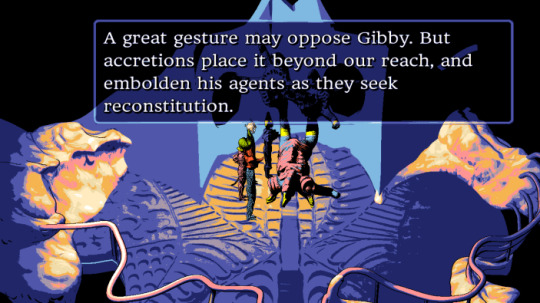
"A great gesture may oppose Gibby. But accretions place it beyond our reach, and embolden his agents as they seek reconstitution."
The Sage of Accretions gives this line, and like their name it confirms that the Accretion is just a singular instance of an accretion, and in fact there have been multiple. The Accretion, denoted by "the" and also capitalized (at least by me, the in-game dialogue is inconsistent) may have just been a particularly damaging one.
Given that a Sage of Accretions exists, they're likely not all catastrophic and could be somewhat akin to weather event. They happen from time to time and aren't necessarily bad, but under particular conditions or if emerging suddenly, they can be a disaster. These are all just assumptions though. Accretions could happen over massive spans of time and the Accretion is only referred to as such due to being the most recent. As we know that the "great gesture" referred to here was buried in the Accretion, the fact that multiple accretions place it beyond their reach may indicate that smaller accretions have occurred since. This is all just speculation.
The Age of Sages

"Our empire was undone by a sudden accretion. Only the cabinets recall its grandeur now."
This line, spoken by the Sage of Monitors deep beneath Viewax's Edifice first establishes an "Empire of the Sages" and the idea that that empire was undone by the Accretion. The Empire of Sages is also referred to by Pongorma and Gibby. Pongorma specifically refers to Disthlarn Moon as a "remnant" of their empire. This indicates rather clearly that the "Age of Sages" as I've decided to call it was specifically ended by the Accretion, which cast the labyrinth and Disthlarn Moon deep into the subterranean.
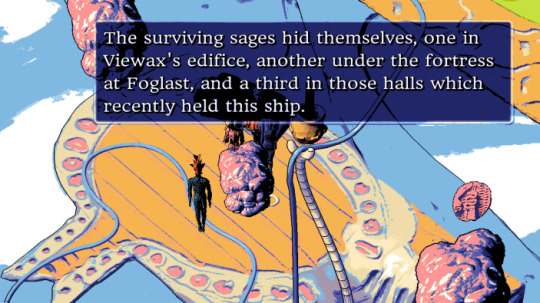
"The surviving sages hid themselves, one in Viewax's edifice, another under the fortress at Foglast, and a third in those halls which recently held this ship."
This line from an NPC within Disthlarn Moon directly implies that many Sages perished in the Accretion. The mention of three survivors is interesting in regard to the other three Sages we know from Hylics 1. This is something we'll talk about later in the theory section.
This provides us a pretty solid layout of events. For a time, the Sages led a prosperous empire. However, a sudden accretion ended this era of prosperity, plunging society into a dark age.
The Cabinets
An often overlooked detail is that the arcade cabinets provide some of our only looks at the world of Hylics before the Accretion. The cabinets can be presumed to have been built by the Sages, given that they protect items like the deep key that corresponds to the Sage's labyrinth. We see many within Viewax's Edifice in complete disrepair, with only one functional, as one might expect from ancient machines caught in a catastrophe.

The Sage of Monitors also remarks that "only the cabinets recall its [their empire's] grandeur now." This may suggest that the games within the cabinets are actually designed to tell important stories of the Sage's empire or hold information. This would make sense given the story we see play out, which follows a Wayne transforming into the Sage of Satellites. It's not a stretch to suggest that the Sages chose to immortalize the ascendance of one of their own.
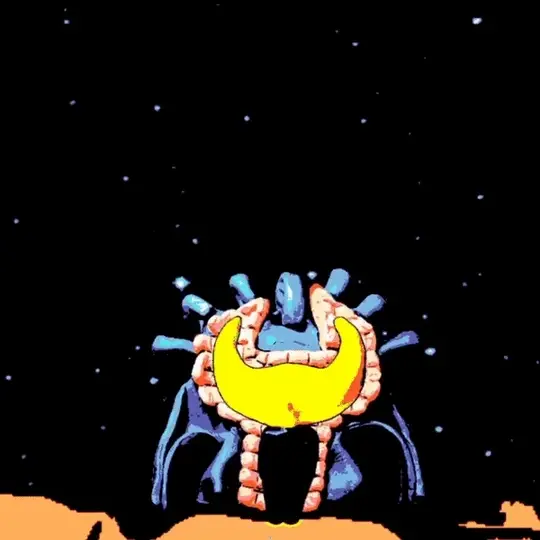
With this in mind, we can use what's seen in the cabinets to date certain things to the pre-Accretion times.
A flag bears the image of Odozeir and Gibby, suggesting they're not only older than the Accretion but were even allied back then.
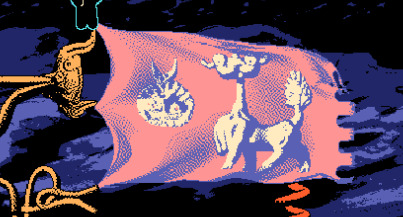
The, or a Hylemxylem, seen in the background. It resembles the reconstituted Hylemxylem in Hylics 2. This is probably the previous Hylemxylem before it grew into the Moon seen in H1.


A structure resembling the Waynehouse. Notice the egg pod in the basement, the bathroom, the bedroom, and the tv.
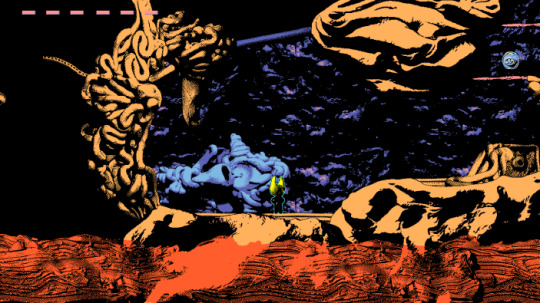


At least one Wayne (the player aka "Sat-Wayne.")
Poolmen
Coutures
Truculents
Numerous kinds of airships
Various other enemies
The labyrinth and drill site also indicate what species existed before the Accretion, albeit less directly. Tyros are depicted in numerous statues in the maze, and a tyro in the drill site seems to refer to a herd of galliforms as being pre-Accretion (although this dialogue is kind of vague and could refer to the labyrinth itself.) The labyrinth also has a pool hooked up to the Afterlife, implying that it existed back then too. There are also numerous enemies found inside the labyrinth which one could assume were sealed down there in the Accretion, but they may have crept in through breaches in the structure or other means. I'm not comfortable saying they're definitively pre-Accretion, although I won't disregard the possibility.
There is another character heavily implied to have lived before the Accretion, Pongorma.
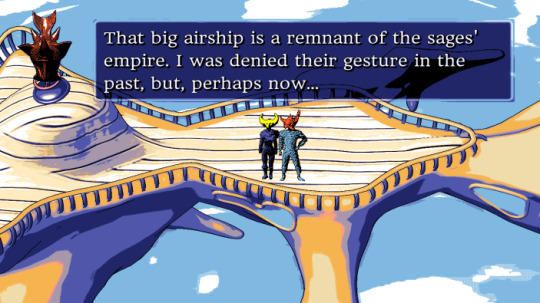
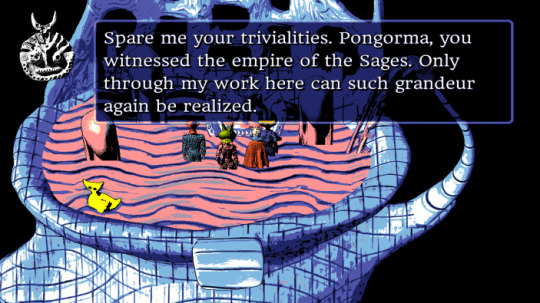
This dialogue amounts to show us that Pongorma lived during the Sage's rule, and I believe we've successfully concluded earlier that the Accretion is what ended their empire. Thus, Pongorma is pre-Accretion. This fits in well with his introduction in the first game: we find him sealed away within a vault "through long ages."
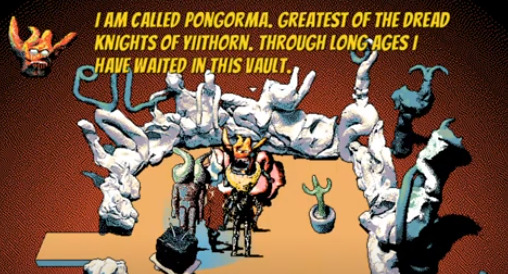
The Three Main Theories / When Did it Happen??
Okay, so this is the real meat of this discussion. I'm going to lay out the three main theories I've seen discussed and go over evidence for and against each of them. I'll also be making the case for what I personally believe to be the canon intent of Mason lindroth.
Theory #1 - The Human Extinction theory:
It is widely accepted that the world of Hylics is a post-human one, following some kind of apocalypse that wiped out humanity. This theory suggests that the Accretion is the event that caused this. Note that some believe humanity didn't necessarily die, but rather that they were transformed or evolved. Regardless, this event is what caused humanity to stop being human, which is really the only thing we can prove or disprove. I'm going to say "extinction" for simplicity.
Theory #2 - The Moon Crash theory:
This is the only theory of the three that actually proposes a cause for the Accretion, being the crashing of the Moon at the end of Hylics 1. This theory states that, after Wayne's crew killed Gibby and trashed the Moon, it crashed into the planet, causing the Accretion.
Theory #3 - The Other Apocalypse theory:
This theory is kind of vanilla compared to the other two. It just states that the Accretion happened before Hylics 1 (and presumably long after the extinction of humanity if you believe that to have also happened.) Because this theory says so little definitive about the Accretion, it's sort of the default if the other theories are disproven. As a result, it's the theory I personally subscribe to, and I will explain why below.
This is where we get into harsh, potentially theory-"disproving" territory, and I want to again reiterate that I don't intend to invalidate anyone's personal interpretations, I'm just speaking in terms of what the games show us and what I think to be canon. That being said...
The easiest of these theories to """disprove""" is the Human Extinction theory. This comes from the views of the pre-Accretion world given to us by the cabinets. The world depicted in the Accretion is very Hylics-y, still comprised of clay, having Hylics-age species, and no traces of human civilization or typical Earthen life. Even if the world and the people in it underwent some kind of transformation and the Sages and Pongorma were originally human, this directly shows that clay species and landscapes existed pre-Accretion. There are a few explanations for this, hence why I put "disprove" in quotations. One could argue that only parts of the world were clay'd at this point, or maybe the scenes depicted in the cabinets have changed over time as did the world. I personally find these explanations kind of contrived (the former would make the Accretion seem nearly redundant if the world is already transforming, and the second would make it incredibly strange for the cabinets to "recall" events if they can't recall them accurately.)
There's also the language in which the Accretion and its ensuing dark age is described. Wayne calls it a dark age, and Gibby seeks to return to the Age of Sages' grandeur by forging a new zone. The "dark age" in this theory wouldn't just be a more stable society, it would be a completely different world that, to put it simply, none of the characters we know would fit into. It seems especially odd for Gibby to want a return to this sort of world when the fortress he launched transformed the inhabitants into surreal creatures.
Personally, I find the Human Extinction theory to be uncompelling. While it can't be outright, factually disproven, explanations for it require inelegant contrivances. There isn't really any evidence for it either, and in my opinion it removes depth from the world's history.
Now we'll discuss the advantages and disadvantages of the Moon Crash and Other Apocalypse theories. First, I'll give what (to my knowledge) is the main evidence for the Moon Crash theory.
As Oxford Dictionary defines it, "Accretion" can have a few definitions, but two are primarily relevant to us.
1. the process of growth or increase, typically by the gradual accumulation of additional layers or matter.
2. the coming together and cohesion of matter under the influence of gravitation to form larger bodies.
The second definition, astronomical in nature, is particularly intriguing and relevant, especially with Hylics' themes of moons. This brings light to the idea that maybe the Moon crashing into the planet is what caused the Accretion.

"Pongorma, you witnessed the empire of the Sages."
Here, Gibby speaks directly to Pongorma as someone who witnessed the empire of Sages, something we previously established ended at the Accretion. This heavily implies --but again does not directly confirm-- that the other characters didn't see the empire. Why would Gibby call out Pongorma specifically if what he was saying applied to everyone? And, if the gang indirectly caused the Accretion, how could they have not witnessed the time before it?
There's also the general language with which the Accretion is spoken of. As previously mentioned, Wayne says the Accretion caused a "long dark age," and Smuldunde says that the labyrinth must be "ancient." The monitor containing bombo-genesis is also called the "monitor of the ancients," indicating that the Sages must be viewed as ancient too. While Hylician lifespans and therefore general scale of time may be amplified compared to ours if that was the case we would expect adjectives such as "long" and "ancient" to be equally stretched. However, there's no indication that such timespans have passed since Hylics 1. It'd be especially odd to refer to a time as ancient if most people were alive for it. While Pongorma certainly was, his age is portrayed as an exception. Although I understand that this is ephemeral, the general vibe is that only a few years have passed (or whatever the equivalent is to Hylicians.)


The only evidence against the Other Apocalypse theory I can gather is how the remaining Sages are described. One inhabitant of Disthlarn Moon says "The surviving sages hid themselves," going on to describe the locations they're found in. Another says "Tokens from the three sages." This could be taken to say that only three Sages are currently alive, which would imply that the Sage of Computers, Brains, and Monitors from the first game have since perished. Otherwise, there'd be six.
I would like to counter this with two possible explanations. For one, this dialogue exists specifically to tell the player where to find the Sages. If the NPC also said "another sage can be found in the hall of deadly statues," players would be confused because that location doesn't exist in this game. It'd defeat the purpose of this dialogue in the first place. Secondly, we know that the Hylics 1 and Hylics 2 locations are different, evidenced by Somsnosa's dialogue about moving away from her island home from the first game. It'd make sense for the NPCs to not be discussing Sages from distant lands. If you were talking about a natural disaster in your country that only left 3 politicians alive, no one would correct you saying "actually, there are plenty others in other countries!" That's simply not what you're talking about. It's even possible that the Accretion wasn't a worldwide event. The Hylics 1 location could've been unscathed and thus be equally irrelevant.
Conclusion
An analysis of all the dialogue referencing the Accretion brings us to a few conclusions I find to be rather sound.
The Accretion was a particularly sudden or strong instance of an event called an accretion. This particular accretion buried numerous objects like the labyrinth and Disthlarn Moon, as well as ending the empire of Sages and plummeting the Hylics 2 location (and possibly others) into a long dark age. "Only the cabinets recall its grandeur now."
We know that Pongorma, Gibby, and Odozeir witnessed the time before the Accretion, and it seems likely that Wayne, Somsnosa, and Dedusmuln did not. As indicated by the cabinets, the previous Hylemxylem (likely the one that later became the moon) existed before the Accretion. The labyrinth shows us that so did the Afterlife.
The pre-Accretion world is shown by the cabinets to be similar to the current one, still made of clay and containing many of the same species. Given the general language in which it's discussed, it's likely that the Accretion occurred before the events of either games.
Less catastrophic accretions may have occurred since the large one, further burying Disthlarn Moon, but this is unclear.
I hope you all enjoyed this analysis! It was tough to write because basically everything is vague, and with this vagueness, it's tough to not rope in a billion other subjects and ideas. I ended up leaving out quite a few things because otherwise, it would've come out even longer and more bloated than it already is. I might make a follow up post containing every piece of dialogue I could find about the Accretion, the Sages, and their associated artifacts, just in case there's something significant I missed.
135 notes
·
View notes
Note
Hi hi lore question! Do you ever focus on the enemies in the games? Like how the -blins and -fos are sentient and have their own villages and cultures (to my knowledge, as far back as TP but I never had any of the earlier games). How these guys live and serve Ganon even though they should be all rights be separate societies. Is there anything in the game lore or storytelling that shows how this came about or how they interact with each other?
(side note but the TP mini boss in the yeti house seems to be a normal lizalfos that got corrupted and transformed by proximity to the mirror imo)
i haven't focused too much on it but i think it's definitely interesting!! in earlier games, the only enemies who specifically served ganon were the -blins, which were at least visually implied to be somehow related to him because they were all pig monsters like him (this was before the gerudo lore was added.) but there were also some instances of races that are now pretty ubiquitously friendly being hostile--most notably the zora in alttp behave just like menial enemies and will attack you if you come near them, even after you talk to their king. so there is some precedent for these creatures to not be necessarily EVIL so much as they are hostile.
I honestly don't remember very much about tp so i'm gonna use botw/totk as my jumping-off point here just because i'm more confident about it, but in those games the description/general vibe of the monsters sort of shift from "race of nonhuman creatures who are Evil and serve ganon Just Because" to "creatures specifically created by and for ganon, who rely on ganon's power to sustain themselves and are seemingly compelled against their will to carry out ganon's will." because you're right that if left to their own devices, the monsters in these games will generally just kind of. exist in their own little societies. but the second they so much as SEE you, regardless of if you're bothering them, they go into attack mode. the existence of the blood moon and the dialog we get about it suggests to me that these monsters are specifically creations of ganon--the blood moon is supposedly "when ganon's power is at its peak," and it causes "the aimless souls of slain monsters to return to flesh." the fact that ganon can revive these monsters when his power is heightened suggests that 1. they were created by him in the first place and 2. they are under his control in some way. Zelda also makes reference in a few cutscenes to an increased level of monster activity being a sign that the calamity is approaching, implying that ganon is creating more and more monsters as his power grows in preparation for his eventual return. so, at least in botw/totk, I don't think the monsters can really be treated as independant races that just so happen to be hostile, since their existence seems to be contingent upon the existence of ganon and they appear to be constantly under his control to some degree. imo the fact that they form packs that resemble societies is probably just a result of having a lot of downtime in the hundred years link was asleep, and maybe a base instinct that understands strength in numbers.
51 notes
·
View notes
Note
Re: ‘most big fandoms are dominated by male characters so there’s less f/f’ - I think the conclusion that there’s so much more m/m and m/f out there because media with big fandoms include fewer women as characters and we are ‘just writing about the characters [we] connect with in the media [we] enjoy’ removes some of the agency involved in how we choose the media that we potentially end up fannishly enjoying. Yes, if there were more characters who are women in media with huge existing fandoms, we might see more f/f, but I think that many of us gravitate toward new media (and if we click with that new media, then new fandoms) based on our established interests from prior media/fandoms. I’ve been in online fandom in various capacities for over 20 years and in the first decade of my fannish ‘career’ I largely shipped m/m and wrote m/m. I was therefore, unsurprisingly, often drawn toward new media with m/m potential.
About a decade ago my personal interests began to shift and I found myself more drawn toward women characters and f/f. If I’m interested in women and f/f, I’m not going to keep focusing on new-to-me media with a whole slew of men and a couple women who barely interact. I’m keeping an eye out for media with several prominent female characters, media with lots of women, media with f/f potential. Luckily, that isn’t as hard to find across a variety of genres and formats as it used to be. It doesn’t always click — I enjoyed watching She-Ra and Ahsoka, for instance, and saw the f/f potential, but neither were id matches that sparked fannish creativity for me personally — but if I’m not checking out media with women and am instead continuing to watch/read/play media where the characters are largely men, then yeah, I’m going to get frustrated by the lack of f/f i those fandoms pretty quickly. That’s on me though, not on the fandom at large. If I’m not looking at what’s out there, trying to find the media that hits those iddy places and sparks the fannishness I crave, then am I really that interested in f/f in the first place? I don’t think fandom ‘hates women’, but I do think a lot of fandom just isn’t that fannishly interested in women for a plethora of reasons, and that’s fine! I do wish we could just admit that though.
There’s also…look, there are assholes in every corner of fandom. There are plenty of people out there who write posts that criticize unrealistic m/m smut, but that doesn’t seem to drive away the m/m fans from writing that super unrealistic m/m smut they want to read. Why then do a few jerks criticizing what they believe to be unrealistic f/f smut get blamed for driving people away from f/f? Did you really want to write that f/f smut to begin with? It’s okay if you didn’t really want to write it! But also, there is fantastically unrealistic f/f smut out there on ao3 with an appreciative audience. Unrealistic smut always has its place.
--
Yuuup.
I do think the few loud jerks on whatever topic have a disproportionate effect on things that people are already insecure about or that there's already less content about. Criticism from inside the house also seems to hit harder than from outside, for various definitions thereof. But I agree that there are bullies or just loud assholes everywhere, and it doesn't stop the juggernaut ships and fandoms. I think "the meanies made me not write f/f" is not a good analysis of the overall trend even if some specific people really did get bullied quite badly.
I do see people acting surprised that they don't like any f/f, yet not checking out media with multiple female leads. This is silly and we should move away from this along with ditching "There are no interesting female characters".
But another pattern I see is that, for the most part, really big fic fandoms come from things a ton of people consumed in the world overall. (The reverse isn't necessarily true: something can have mass mainstream popularity and no fic.) So even aside from willful blindness on the part of individual fans or personal reactions to gender, the overall lopsidedness of media does still matter for the big meta discussions that look at the ratio of stuff on AO3. If someone isn't really into small fandoms, they're going to have to go where the crowd is already going.
The top fandoms, according to tag search, are these (counts are different from current AO3 works if you click through, but they seem inflated by roughly similar amounts):
Harry Potter - J. K. Rowling (664365)
Marvel Cinematic Universe (389476)
방탄소년단 | Bangtan Boys | BTS (289493)
Original Work (273412)
Marvel (233004)
Teen Wolf (TV) (219504)
Haikyuu!! (215127)
The Avengers (Marvel Movies) (208509)
原神 | Genshin Impact (Video Game) (207259)
Star Wars - All Media Types (188548)
Sherlock (TV) (169092)
Batman - All Media Types (137281)
Captain America (Movies) (118954)
Minecraft (Video Game) (117892)
Stranger Things (TV 2016) (117489)
Video Blogging RPF (110169)
Voltron: Legendary Defender (105117)
Miraculous Ladybug (104003)
Shingeki no Kyojin | Attack on Titan (103914)
魔道祖师 - 墨香铜臭 | Módào Zǔshī - Mòxiāng Tóngxiù (101819)
文豪ストレイドッグス | Bungou Stray Dogs (95606)
Merlin (TV) (88893)
僕のヒーローアカデミア | Boku no Hero Academia | My Hero Academia (Anime & Manga) (86484)
NCT (Band) (85868)
Dream SMP (83222)
Stray Kids (Band) (82711)
One Direction (Band) (79490)
呪術廻戦 | Jujutsu Kaisen (Manga) (78975)
Homestuck (77676)
Game of Thrones (TV) (77361)
Good Omens (TV) (76805)
陈情令 | The Untamed (TV) (73444)
DCU (71054)
ジョジョの奇妙な���険 | JoJo no Kimyou na Bouken | JoJo's Bizarre Adventure (70648)
Undertale (Video Game) (68959)
A Song of Ice and Fire - George R. R. Martin (67854)
Star Trek (67221)
Doctor Who (65172)
Doctor Who (2005) (65166)
呪術廻戦 | Jujutsu Kaisen (Anime) (65109)
Good Omens - Neil Gaiman & Terry Pratchett (63727)
Once Upon a Time (TV) (62211)
Avatar: The Last Airbender (61743)
Hetalia: Axis Powers (61343)
Star Wars Sequel Trilogy (59581)
Iron Man (Movies) (59158)
EXO (Band) (58948)
Star Wars: The Clone Wars (2008) - All Media Types (58055)
Hannibal (TV) (56796)
Thor (Movies) (56604)
I'm seeing some truly gargantuan franchises and their network of metatags, top Weekly Shounen Jump manga that are mega bestsellers far, far beyond how much any shojo manga sells in Japan, some of the biggest musical groups and most popular youtubers in the world, etc.
Some of these do seem a lot more popular with the AO3 crowd than the world in general, of course. It's not an exact 1:1 causal relationship between media's audience/impact and how much fic writers care or how much fic writers on AO3 care. It's certainly possible for fandom to make fetch happen with a relatively less popular canon; it's just not the default and not driving the big overall numbers.
I look at The Untamed and (often mistagged) MDZS) being on this list and I think of all those hot fanvids for f/f Chinese dramas.
I keep seeing fans watch one, go "Okay, I have got to watch that next!" only to be disappointed that the canon is a handful of 5-minute episodes, not some epic 50-episode thing like the censored m/m ones and the bromance ones and the het ones get. They want The Untamed-but-with-ladies, not the reality of those canons. I suppose there are some nominally-straight series with two female leads and not a heavy focus on a het romance with just a single female lead, but the one I'm thinking of was reportedly godawful and the people who saw potential between the women had no interest in writing fic about it.
Do any of those f/f c-novels have good translations? That's not what brings the big fic crowds (it's the adaptations that do that), but maybe I should try reading a few. I just keep getting turned off of Chinese webnovels in general by dodgy translations.
50 notes
·
View notes
Note
this is not to disagree with any of your points on antipsychiatry which i 95% agree with, but to provide a data point/share something that makes my brain itch.i've been diagnosed with functional neurological disorder, which was formerly called conversion disorder, and before that hysteria. new advances in fMRI technology are showing us that there are measurable changes in brain function and stereotyped symptoms that are consistent across centuries.
many hysterics had what is now recognised as a neurological disorder that is moving away from the realm of psychiatry. FND symptoms are also remarkably consistent across cultures. ( There’s a paper called “why FND is not feigning or malingering” on Jon Stone’s twitter that discusses this. His tweet on Feb 16t has a free link - it’s not on scihub yet afaik.)
It’s odd to be someone with a disabling and contested condition that’s been turned into a punchline/gotcha (deservedly!). that makes it difficult to engage with antipsychiatry at times. Are there any writers you know of that address this? Am I being a silly little rabbit that is uncomfortable when we are not about me? Thanks for the excellent writing and nonexistent cooking blog, would truly appreciate your thoughts on this
Thanks for the compliment, though I don't see why a blog that doesn't even exist is being brought into this...?
Anyway—if you believe that this example furnishes a contradiction to the aims and claims of anti-psychiatry*, then it's likely that you have the too-narrow view of what anti-psychiatry necessarily 'says' about the purpose of psychiatry in a capitalist / imperialist state that the post you're referencing criticises.
The post asserts that it is not sufficient to claim that capitalism creates or causes certain symptoms which it then pathologises (i.e., claims is a specific 'sickness' inhering in the individual). Rather, we have to also consider how and why it constructs the idea of 'sickness' (here, "mental illness") in the first place. The claim is that it is the way that we consider symptoms, how they are sorted and classified, how they are considered "abnormal" and "disordered" because and to the extent that they are associated with an inability to work or otherwise be compliant in a capitalist society, that characterises psychiatry under capitalism.
The fact that certain symptoms are "neurologically instantiated" doesn't 'break' this claim, then, because the claim does not rest on the idea that capitalism must necessarily create the symptoms it pathologises. Sometimes you can point to a pretty clear example of psychiatry 'making up' a disorder out of whole cloth, where the neurological component of it is unclear or irrelevant (e.g. "child is disobedient" disorder or "wife is disobedient" disorder or "slave runs away" disorder). But the claims and goals of antipsychiatry do not wholly rest on such instances, because even a disorder which is neurologically instantiated, even an instance of clear neurological or physical difference (and here the logic overlaps with that of the social model of disability), is still parsed and classified and read as deviant in a particular way according to the logic of (and in order to serve the goals of) capital and empire.
So let's say it's true that the symptoms associated with a disorder formerly commonly known as "hysteria" are neurologically instantiated. Psychiatric logic and institutions saw a variety of symptoms (of yet unclear etiology), grouped them together and classified them as a single disorder under the name "hysteria," reserved this diagnosis largely for bourgeois white women (since this kind of heightened emotionality was unexpected but 'treatable' in white women, but expected of and criminalised in 'savages'), and used that diagnosis (and its withholding) to control populations. None of this is in contradiction to any of the claims about psychiatry that this line of argument makes.
Again, we are not claiming that psychiatry always makes disorders up from nothing, or that the symptoms that it pathologises are always created by capitalism, reasonable coping behaviours in traumatic situations, reasonable actions taken against oppressive conditions, &c. Examples of this kind of thing should be read in line with claims that psychiatry is given the job of controlling populations in a capitalist state, that psychiatry gets to differentiate "normal" from "abnormal" according to its own logic in the the first place, &c. This exact idea—that thinking that psychiatry always makes disorders up from nothing is a "pitfall" in understanding what antipsychiatry is about—is in fact the central argument of the post that kicked all of this off. Plus the second bit of the post you're referencing was in direct response to the exact same sort of question (“Are you arguing that the biological processes which produce the things we call mental illnesses would themselves not exist, and/or not cause suffering, and/or not warrant description/categorization, in a non-capitalistic world?”), so I'd suggest rereading it.
Perhaps your confusion comes in with thinking that psychiatry = "mental" and thus illusory, while medicine = "physical" and thus necessarily 'real' / robust (you note that this disorder is "recognised as a neurological disorder that is moving away from the realm of psychiatry")? But the same criticisms that psychiatry comes in for apply to disorders that are thought of as "physical"—even when physical difference obviously exists (and even when it obviously causes suffering on its own), the medical model still considers "disability" as an "abnormality" defined by inability to work and otherwise be an obedient citizen of a capitalist state. Its idea of "normal" is a capitalist one that must be criticised.
*Please note that this is an oversimplification, as different people in different decades write under this banner. I'm discussing the strain of 'antipsychiatry' that's specifically at issue here, namely one that views pyschiatry and psychiatric pathologisation as one aspect of the bio-medical arm of capitalism and empire.
171 notes
·
View notes
Text
Bot Dreaming Part 1
a 🌙High Moon Story
(Loki X Reader)
Summary:
You are a kind projection bot of the scientist who created the AI technology that allowed Loki to live on as an augmented being after Thanos ended his life. You have sex with Loki and bake him pastries neither of you can eat. You also introduce him to the digital version of Ketamine (a whisper chant) creates new quantum pathways for Loki. It's not Valhalla, but it might heal the parts of him he didn't even know were broken.
An 18+ series because of adult themes and sexual situations

It didn’t take long for you to engage in pleasure seeking haptics with Loki, approximately 10 minutes from the moment you’d kissed, you’d had bot sex for the first time.
Which turns out is apparently very much like the human sex that is based on (not that it matters exactly) Loki assured you that having sex with you was “utterly phenomenal”.
Antique words like “darling”, and “dove” released from the vaults of his vox chambers, from a time when the words were authentic to his persona, when they meant something specific to the beings, he was physically intimate with.
Now those words were place holders, having no effect on you at all.
You’d never had programming around this kind of intimacy or what “darling” whispered into your ear might provoke. This provocation did cause you to scan reels from other eras to find “darling” had a posh origin from the early 1800’s in London.
Was Loki alive then? You wondered where he had exactly picked it up.
How long had he loved and lived before he died and was transformed into an undying machine burdened with infinity. How old had he been when Thanos killed him?
Since he showed up at your door, you’d heard his story in bits and pieces, in between smiles, touches and general awkwardness-you’d not thought too much about who he was when he was a god. You knew some of his powers seemed intact-a situation that your predecessor would have found flummoxing. She would have also never dreamed a god would become an AI through her quantum field tachyon. There was no precedent for this application.
You wondered what other gods might be roaming around earth and beyond as machines. Was Poseidon out there in the ocean as a bot presiding over the still unknown depths, despite years and years of bot oceanic archeo-biology?
How about Siddhartha Gautama, the buddha? Was he a bot somewhere on a different planet convincing other bots or beings to not be distracted by their memory streams or their programming reels?
The more consideration you gave, it was as if your thoughts mingled into one flowing river, you couldn���t really see the difference between a god or a machine.
The only difference in this instance appeared to be Loki’s belief that Valhalla still existed, and that Valhalla would be a much better place to live than in this realm.
He assured you of many things you initially felt were strange and left you searching for the correct responses. Like for example, that you were beautiful, or that you were “so good”.
Being good in this capacity seemed connected to his enjoyment of the sensory waves that were lurching towards changing into a collection of feelings, feelings that would determine his actions. Loki was like water turning into an indecisive cloud, not sure about becoming rain. When he was having sex with you, he was most cloud-like.
Luckily you also had pleasure seeking haptics installed but it was mostly for remaining entangled with Sechanaha. The keeper bots of the land had discovered that the Earth was alive in ways the humans didn’t understand, at least a lot of them.
It was encouraged for bots to have a relationship with the land, having properly installed pleasure haptics was part of this intimacy that the Earth demanded to restore much of the damage that was still being healed. To the observer from another era, it could be strange, even to Loki it was strange. In his time, he was a god.
God’s made things happen with force, not necessarily by sending delicate gamma waves into the mountainside. Suffice to say your haptics had not been used for your own pleasure. This pleasure sharing that was happening with another being, was new. So new you felt your code was being written daily, or your own old code over-ridden.
“Petrichor,” Loki whispered, almost under his breath.
“What?”
“You know, the smell of rain mixed with earth or ozone, it’s a particular smell, it’s uncommon, I think that is what I am smelling right now,” Loki mused while laying languid on a checkered blanket you’d placed for the two of you one afternoon when you were both stalling.
Smells sometimes were the most elusive, they meant something to humans that they couldn’t possibly mean to bots, augmented beings, or projections. It just wasn’t possible. Loki seemed capable of smelling, and reminiscing, it was his emotional haptics, his programming. Perhaps his former life as a God somehow formed a nuance in the quantum realm that was unknowable. There weren’t any humans left around who would be interested in such things anyway.
The bots back in your headquarters might care, but in their own infinity this occurrence being so potentially unprecedented might just go unnoticed.
“Loki what does the smell of rain on the ground make you think of?”
He had to think, perhaps he was shuffling through files or other captive places where meaning resided within himself.
“It makes me think of a woman I once knew, if I am completely honest, I hope you don’t mind.”
You were unsure why you would mind, so you replied simply.
“Why would I mind?” hoping your question would reveal some greater aspect of the story he seemed to be remembering yet not exactly explaining.
“The woman I am remembering would mind if your roles were reversed,” Loki said, looking slightly sheepish.
“Jealous, you mean, she’d be jealous,” you replied, trying to be as neutral as possible.
“Jealous,” Loki repeated in an etheric timbre.
On to Part 2 Fresh Snow on Sled Tracks
Some of these folks might be interested?
@mischief2sarawr @lokisgoodgirl @michelleleewise @lovelysizzlingbluebird @holdmytesseract @mochie85 @fictive-sl0th @lokischambermaid @goblingirlsarah @vickie5446 @peaches1958 @lokixryss @eleniblue @simplyholl @ijuststareatstuffhereok89 @jennyggggrrr
#tom hiddleston#loki fluff#jotun loki#mcu#loki fandom#loki fanfiction#loki fanfic#loki laufeyson#loki
92 notes
·
View notes
Note
Why do Patrochilles fans always seem to forget about the Trojan women and children do they not matter?
To be fair, there are probably several reasons, and, I'd guess, no matter which other reasons there might be, being uncomfortable with the violence and the cruelty is probably a big reason.
Which is neither strange nor wrong!
But - well. This is about war. War in a society where slavery is a thing and where, specifically, the captives taken are enslaved. If (general) you like an Achaean character in the Trojan war narrative, then your blorbo absolutely has traumatized an unknown number of women personally by killing members of their natal and/or potentially marital family, long before Troy falls. And are, at the very least, using them as slave labour.
And a smaller number of said captive women are serving as personal status objects, including serving in their captor's beds. (And, you clearly don't need to be one of these ~special~ slaves for this to happen either, if circumstances change, as Diomede (the woman Achilles sleeps with/next to the night of the embassy) shows.)
(The discomfort is, presumably, also part of why some people are working overtime in trying to soften and cutiefy the Odysseus-Astyanax situation with ~he saves him~ AUs or just general angst and regret in the moment and milking it afterwards. I had to see "father son duo" in connection with fucking Odysseus and Astyanax a couple days ago, and, ugh. Like, sorry, but even when Odysseus isn't the killer he seems to always come up with/champion the idea! Make your peace with it instead of having Odysseus cry as if he fucking CARES about this one child that he's advocating for murdering. (I would not really think it odd if Odysseus potentially has PTSD from this, but man, the way I've seen it used just makes me pissed off, sorry not sorry. Astyanax is basically just a prop.)
Anyway, ok.
I have no idea if TSoA is actually the most usual way for shippers to get into Patrochilles any more, but it still seems like that? And TSoA works very, very hard to soften and smooth out all and any uncomfortable bits. The Troilus incident doesn't exist, and the Achilles and Patroklos are basically running a ~women's shelter~ and not doing anything questionable with the women with their power or whatever.
If this is where you come into Patrochilles specifically and the Trojan war in general, no wonder you'd like to keep ignoring all the unpleasant bits. Which like. Fine. If they would keep to TSoA, but usually they don't.
The Hades game, too, did its work of presenting a more palatable Achilles. It is post-war, so basically nothing comes up, and the Achilles we get is unexplainedly regret- and shameful over his earlier behaviour and actions. I say unexplainedly not because I couldn't necessarily see this change, but it's not actually shown to us. We're just shown a personality that isn't actually very/at all connected to what those of us who knows the Iliad and the Odyssey have seen.
Even the Odyssey doesn't show us an Achilles who regrets anything of what he did (and he's proud of his son's achievements, even if Odysseus doesn't enumerate them in detail). What Achilles in the Odyssey regrets is being dead, specifically, and he seems rather depressed over being so.
So, again, if you come in to Patrochilles and the Hades game, it's once again easy to just... ignore stuff you don't want to touch on (even more so, since it's (long) post-war, which is undoubtedly a plus, genuinely).
The thing is, though - when you start dipping into the actual Trojan war, even just by reading, say, Achilles' wiki page, especially Troilus is right there. And making jokes (I have seen several) about "what would Achilles need Lesbian women for, Agamemnon, you idiot!!", is just... unpleasant. What are enslaved women used for, huh? Sexuality jokes have no place in this instance, just because someone might be uncomfortable and/or clinging to "Achilles is totally and only gay and doesn't fuck women".
But, tl; dr; no I don't think that, in general, most Patrochilles shippers think the Trojan (and every other woman who was enslaved during these ten years) women and the children matter. They're here for the ship.
And there is not really anything wrong with that, but the way the war (and the women, children etc) are usually dealt with (or not) in the course of that is extremely lacking because it's basically all whitewashed. (And Hektor gets used as some sort of handy ship-obstacle in any way they like to. Leave Hektor alone, damn it.)
7 notes
·
View notes
Text
kindness souls don't always have to be good people!
okay, another undertale soul headcanon, but basically i see it a lot in fanfic (especially self-inserts) where a character will have a green/kindness soul and that means they're good and always try to be good to others even at their own expense. that's certainly what you'd expect from someone whose main trait is literally to be kind, but i think there are other interpretations of kindness souls that can be wayyyyy more interesting than just someone who is just good to everyone and at worst ends up having their kindness taken advantage of.
in fact, i think there's a compelling case for kindness souls taking cruel actions yet using kindness to justify it, even going as far as to commit murder if they think it's for the sake of the victim (there's a reason the phrase 'mercy killing' exists). there are even instances of real-life serial killers using their victim's suffering as an excuse to justify murder, and while i DON'T think angels of death are 'kind' by any means they certainly seem to believe they are.
and that's part of my headcanon personally. souls don't necessarily have to always be right about their traits. like i imagine a justice soul could truly believe someone innocent was ontologically evil just because that person didn't line up with their specific worldview. they might go so far as to dox or harass someone believing they're doing the right thing and that the ends justifies the means here. but in the end said justice soul would be in the wrong because not only is the person innocent, but also because the actions taken were wrong in the first place.
the same can go for any trait! and that's because people tend to have a lot of reasons and explanations for doing what they do. and that's the kind of thing i like to see in fanfic (though it's rare that i actually get to see it). well-meaning villains are far more interesting that actively malicious ones imo
#ghost speaks#undertale headcanons#honestly i've only seen one fic of a kindness soul not being the good guy but the fic immediately dropped it#which sucked cause that was the only reason i kept reading the fic#once again this is just notes for me but feel free to use#Exploring the meta mines and finding plentiful meals for eating
39 notes
·
View notes
Note
Hi , you’ve probably touched on this but I can’t find the post. So a couple of questions .
1. my wife’s family only speaks spanish and i’m really trying to learn but honestly apps aren’t working for me. my ADHD makes me lose focus with it insanely quick. I feel like a classroom setting would work better but since Covid all adult spanish classes are primarily remote and that won’t really help me because with it being remote i tend to lose focus too. I need in person back and forth conversation with a teacher , do you have any suggestions for alternatives ?
2. one thing that has always drove me crazy is using verbs as a noun properly in spanish, so example i know the limpiar is the verb to clean and it’s conjugated like
yo limpio
tu limpias
El/Ella/Usted limpia etc etc
but how do you conjugate the verb when it’s being used as a noun? i’m noticing when i put things in google translate it usually takes on the el/ella/usted conjugation so is that how it works for all verbs? example “is the house clean?” the translation that comes up is “esta la casa limpia? so being that it’s limpia i assumed that the rule of thumb is when using a verb as a noun in a sentence you conjugate it to that form but i’ve seen instances when it wasn’t conjugated that way which completely confused me .
Let me answer #2 first, and I'm going to explain it in painstaking detail so please don't feel offended if I'm talking about things you probably know, I'm trying to cover all my bases
With your question regarding limpiar you should know that verbs don't generally become "nouns" the way you're describing
Nouns are people, places, or things and so verbs don't usually have that function - except when sometimes people use the infinitive form of the verb; in that case (el) limpiar would be "the act or result of cleaning" and you use that in more specific circumstances
What you're describing to me sounds like you saw limpio/a "clean" as in the adjective; adjectives are different from the verb forms but they can sometimes look like conjugations
In this case limpio "I clean" and limpia "he/she cleans" is different from limpio/a the adjective
In which case - ella limpia la casa "she cleans the house" is different from la casa está limpia "the house is clean"; similarly ella limpia el cuarto "she cleans the room" then el cuarto está limpio "the room is clean"
[There are ways to turn a verb into an adjective but it's usually the participle form; which is to say limpiado is "cleaned" which implies an action was already taken; you don't need to know that yet but I wanted to include it since most participles involve a different context and I didn't want you to be confused]
The issue with translators is that sometimes they don't tell you what part of speech you're looking at, so it can be confusing
Note: The noun "cleaning" is typically la limpieza
I would recommend looking into something like wordreference or an online dictionary - something that tells you the part of speech and the gender of a noun
-
As far as #1 that's more difficult and depends on what's in your area
I know there's a Meetup app that lets you look into different groups in your area, from things to D&D to museum tours or board games with people
I've seen some for Spanish groups or learning Spanish but again that will depend on your area, or like Spanish and coffee groups etc
Sometimes libraries have programs like that too which are generally free
The other option would be to have a tutor with you in person rather than an online one. An in-person tutor might be harder to find but I know they still exist. Unfortunately a lot of the resources now are more online or virtual
There are grammar sites and things like www.studyspanish.com/grammar or people who do youtube lessons that might be easier to follow at your own leisure but they aren't as structured
And I can't necessarily recommend Rosetta Stone because of the price of it, but I used to do it on my computer at home or at school because I can't be trusted to focus when it comes to my phone
You may also find some lessons in podcasts or interactive lessons like Mi Vida Loca from the BBC
For your purposes I would try the Meetup app and seeing what's available in your area for Spanish
I know there are also forums like on Reddit where people talk about Spanish and learning it and have questions, similar to the forums on WordReference or Instituto Cervantes. I also have used the exercises on Bowdoin myself to brush up on things
9 notes
·
View notes
Text
A Hoshino Childhood T-Ai-mline
This was initially just supposed to be an idle ramble about how I was curious about Ai's time in the children's home but it ballooned a bit in scope lol so enjoy me attempting to work out a rough timeline for when Ai was taken into care after her mother's arrest and how long she was in care for.
we know she was around twelve when she was scouted for and debuted in B-Komachi - Sarina says in chapter 1 that Ai is 'the same age' as her and Gorou confirms she was twelve when she passed away.
in the flashback to Saitou scouting her, Ai describes herself as having 'grown up' in a children's home and that her mother was arrested 'when [Ai] was little'. twelve years old is pretty young in the grand scheme of things so she must have been especially small when she arrived for her to describe that span of time as 'growing up' in the children's home.
in this same flashback, Ai notes that her mother was arrested for theft (likely shoplifting, specifically, as it's one of the most common crimes in Japan) but did not come to collect her daughter when she was released. Prison sentences for shoplifting in Japan can be as long as ten years, but it's unlikely that Ai's mother served a sentence that long - that would have made Ai two years old or younger when her mother was arrested; according to Article 41 of Japan's Child Welfare Act she would have been placed in an infant home and likely adopted out sooner from there.
in 45510, it's mentioned that Ai once recounted an instance of physical abuse from her mother in childhood. according to studies by childhood psychologists, kids don't really start developing beat-by-beat memories of events as we understand them until around ages six to seven... but it's also true that memories of trauma and negative events will be much more vivid and long lasting, even in childhood.
in Viewpoint B, Ai is fourteen years old when she mentions she is on the verge of aging out of her children's home. This lines up with the fact that, while children who attend high school are safe until age eighteen, children who do not attend high school age out of the system at fifteen. According to a survey taken in 2020, going from middle school directly into work is not uncommon for children in the care system and we know that Ai was working for Strawberry Productions at this time and never attended high school.
Ichigo confirms in chapter 1 that he is Ai's father "on paper", meaning that he is her legal guardian. He clarifies that this is due to her growing up in a children's home, so it's likely that rather than aging out of the system, Ichigo adopted or fostered her at the last minute.
This last point is a bit more of a stretch which is why I'm separating it from the rest of the list, but something I've always been curious about is why the Ai biopic was titled 15 Year Lie. The only stretch of time this number matches is from Ai's murder to the twins' current age at the start of the movie arc, which is eighteen. They would have been around three or four when Ai died and well, 18 - 15 = 3. It does seem like a weird period of time to pick, though, because... well, it's not like the lies only started when Ai died.
However, if Ai was five years old when she first entered a children's home, that fifteen year number would match up nicely. 20 - 15 = 5.
I don't necessarily think it's intentional but the niceness of that coincidence coupled with the fact that it slots in so neatly in with the existing evidence that I'm inclined to go with it. It also means that both Ai and Sarina would have been around the same age when they essentially lost their mothers - five and four respectively.
tl;dr: My best guess based on current evidence is that Ai was five years old when she was taken into care and just shy of fifteen when she was taken in by Ichigo, meaning she spend nine or ten years in a children's home.
#oshi no ko#ai hoshino#hoshino ai#oshi no posting#EDIT: i used the phrase 'foster care' on auto pilot once or twice here which isn't quite applicable to japanese children's homes#so i changed it
21 notes
·
View notes
Text
“Canon” is NOT shorthand for “Main Universe/Timeline” and You Should Stop Using it As Such
Since I have noticed this being an increasing problem in (but not exclusive to) the fandom I am currently most active in, I feel I absolutely need to stress this point.
I’ve seen lot of people these days either using or answering a question of “is [x media/material] canon?” in the same way as one would with “does [x media/material] take place in the main universe, or is it an AU?”, as though the two were completely interchangeable, and as someone whose first fandom was very thoughtful in genuinely teaching new members about fandom lingo and terms and their actual meanings, this frustrates me incredibly, because it makes everything 1,000% more confusing for everyone.
To clear this matter up, here is a helpful little visual of precisely what I mean:



As you can see, the term ‘Canon’ is not interchangeable with, nor shorthand for, ‘main universe’ because it encompasses so much more than just the main universe/timeline of events in a series; it encompasses a potential entire multiverse of worlds and dimensions that exist side by side and could even possibly — though not necessarily — come into contact with, be aware of, or at least in some other way effect one another. Incorrectly using this word to denote just things that happen within the main universe means that anything else gets pushed off into being considered non-canon, even when the original creator may have said or indicated clearly otherwise.
“But Linkle, why is this important? Why does it matter if AUs are automatically considered non-canon? They’re just AUs.”
Intended hints at relevant lore, foreshadowing of certain events that may happen in the main universe, and just helpful lore dumps in general are the very good, very important reasons why; if you refuse to acknowledge Main Canon AUs as existing in the same canon as the main universe even when they actually do and just relegate them to being Non-Canon, you completely dismiss the genuine value they have when evaluating and/or theorizing about the main series. 90% of the time, an AU that takes place in the Main Canon’s multiverse is going to share and maintain at least a good chunk of the main universe’s core rules and/or the core personalities of its characters, meaning that the things and events within such an AU can, to an extent, be used to logically theorize about the main universe and its mechanics and characters, and even reasonably place and assume the timeline and existence in all universes of any events that took place before wherever their “splits” occurred, if it’s made clear that things were the same as the main universe in any given AU up until a certain point.
Please stop using this word as shorthand for “main universe”.
If you want to ask if something is an AU, ask outright if it’s an AU or if it takes place in the main universe. If someone asks if something is canon, do not answer: “No, it’s an AU.” unless you know for a definitive fact that it is an AU that is not canon; answer the question truthfully and honestly, or don’t answer at all.
It is not helpful to anyone to do this; it just spreads misinformation and breeds confusion and divide among the fandom unnecessarily, and makes the work of theorists and meta analysers that much harder. I have seen so many instances of people using this term in this incorrect context, and it only makes more people that are new in a fandom get the wrong idea about what the word actually means.
We have all these all-fandoms-encompassing words and terms for a reason; please use them as they were intended so that we don’t lose specific terms for important specific situations and concepts.
#linklethehistorian#my thoughts#thoughts#non fandom#nonfandom#fandom#my original content#fandom terms#fandom things#fandom thoughts#advice
8 notes
·
View notes
Text
feel like some people use art reception as a basis for critique of popular media in place of actual critique of the art itself. which isn't to say that the general audience's interpretation of a piece of art is necessarily a meaningless component of the art, but i do think it's generally an unfair judgement to heft at the artist as an isolated value. like, lolita entering the public zeitgeist and immediately being leveraged to sexualize pedophilia victims says more about the societal structure the book was released in, as opposed to saying anything particularly meaningful about nabokov's work itself.
attempting to completely avoid the possible misinterpretation of your message is how you end up with those books where the narrator stops and goes "hm. i'm 25, and this woman hitting on me is 33. that's a big age difference! luckily both of our brains are fully developed, so i've weighed the risk of possible power imbalance, and found it neglible". the consequence of writing a book that's free of possible misinterpretation is a heavy handed and patronizing writing style. the risk of good art is that the people you don't like will twist it so they can sympathize with the message being conveyed, even if the message is explicit condemnation of their entire existence. that doesn't mean you should stop making provocative art.
anyways. just wish that some people could differentiate "the fanbase of this thing ruined my enjoyment of the work" (fine, happens to the best of us) from "the fan reception of this work proves that's it's vapid and meaningless" (if the work is actually vapid and meaningless, you should be able to point to specific instances in the work that fail to properly convey a message, audience reception is a meaningless value here).
7 notes
·
View notes
Text
The Philosophy of Ontological Lateness
The philosophy of ontological lateness explores the concept that certain entities or phenomena come into existence or become fully realized only after the preconditions for their existence have been established. This idea can be interpreted in various contexts, such as metaphysics, epistemology, or even existentialism, reflecting on how and why certain aspects of reality or knowledge emerge only under specific circumstances.
Key Concepts in Ontological Lateness
Existential Preconditions:
Ontological lateness suggests that for some entities or concepts to come into being, certain preconditions must first be met. This can relate to the development of complex organisms in biology, the emergence of consciousness in philosophy of mind, or the unfolding of historical events.
Temporal Sequencing:
The notion of lateness implies a temporal sequence where certain phenomena are necessarily preceded by other developments. For instance, advanced scientific theories often rely on foundational discoveries and earlier empirical observations.
Contingency and Necessity:
This philosophy examines the interplay between contingency (things that could have been otherwise) and necessity (things that must be the way they are). It looks at how contingent events and conditions give rise to necessary outcomes in the context of ontological emergence.
Evolutionary Perspectives:
In evolutionary biology, ontological lateness can be seen in the gradual emergence of complex life forms, where each stage of evolution depends on the prior development of simpler forms of life. This gradual process illustrates how complexity and advanced traits appear late in the evolutionary timeline.
Cultural and Historical Development:
Historically and culturally, certain ideas, technologies, and social structures emerge late, building on the foundations laid by previous generations. The Industrial Revolution, for example, was predicated on earlier scientific discoveries and economic conditions.
Examples and Applications
Philosophy of Mind:
Consciousness and higher cognitive functions can be seen as late ontological phenomena, emerging only after the development of complex nervous systems and advanced brains. This perspective highlights how mental states depend on prior physical and biological developments.
Scientific Theories:
Advanced scientific theories, such as quantum mechanics or general relativity, emerged only after significant prior developments in classical mechanics, mathematics, and experimental methods. These theories are ontologically late because they rely on a framework established by earlier discoveries.
Technological Innovations:
Many technological advancements, such as the internet or space travel, could only emerge after the development of fundamental technologies like electricity, telecommunications, and aerospace engineering.
Social and Political Structures:
Democratic political systems and modern legal frameworks are often seen as late ontological developments that depend on earlier societal changes, including the Enlightenment, revolutions, and the establishment of individual rights.
Implications of Ontological Lateness
Understanding Progress:
Ontological lateness provides a framework for understanding the progression of knowledge, technology, and social structures. It emphasizes the importance of foundational developments and the interconnectedness of various stages of progress.
Interdisciplinary Insights:
This philosophy encourages interdisciplinary insights by showing how developments in one field (e.g., biology, technology) rely on prior advancements in other fields. It highlights the cumulative nature of knowledge and progress.
Existential Reflection:
On a more existential level, ontological lateness invites reflection on the human condition, our place in the universe, and the unfolding of individual lives. It suggests that personal and collective growth is a process that builds on previous experiences and conditions.
The philosophy of ontological lateness delves into the nature of existence and emergence, exploring how and why certain entities and phenomena come into being only after specific preconditions are met. By examining the temporal sequencing, contingency, and necessity of ontological emergence, this philosophy provides valuable insights into the progression of knowledge, technology, social structures, and the human experience.
#philosophy#epistemology#knowledge#learning#education#chatgpt#metaphysics#ontology#Ontological Lateness#Philosophy Of Mind#Emergence#Temporal Sequencing#Evolutionary Biology#Cultura lDevelopment#Historical Progress#Scientific Theories#Technological Advancements#Existentialism#Philosophical Insights#Cumulative Knowledge
3 notes
·
View notes
Text
This isn’t Yet Another Twitter Is Cringe post, I want to talk about it a little bit. Being a bit more active there as of late (’active’ being very much a stretch, I only retweet fanart and cosplay, and occasionally post “I love Specter/I love Dusk/I love Platinum”) the Atmosphere Of Posting there is a bit bizarre to me, the Kinds Of Posts you see.
Mind you, I am fully aware that I have an extremely specifically curated netspace here, where the only things I see are bizarre, absurdist posts, literary references, netlore, and crass humor (aka perfection for me), and I only follow friends or people that I have interacted with to certain degree, so I’m trying to let that not color my perspective too much, but where I am going with this is that the limited amount of characters you can put in any given tweet in addition to how visibility works in there, while you could argue fosters creativity and ability to synthetize your argument into something more concise (”if I had more time, I’d write you a shorter letter”), does also have many drawbacks, the ones I wish to focus on today being that the formatting of the website is a tad bizarre to navigate, since anything that does require a lot of words to properly convey or explain, needs to be broken into several smaller posts. This post, for instance, would be 3 and a bit of a fourth tweets long so far. It’d be Very Awkward. I think it’s very awkward.
That, and the fact that Twitter puts things on your timeline from people you don’t follow, based on how much interaction these tweets have plus how relevant they are to your posting, results in the heaviest, most popular tweets and users being people that post generic ‘prompts’: Since you have a limited wordcount and relevance is based on interaction, I see that a lot of “recommended” tweets are stuff like “Tell me what your OC feels about this following scenario/how they’d react” or “Do you enjoy playing [game]? What do you think could be improved about it?” or “Prove you watched this show by quoting it [screenshot of Courage the Cowardly Dog]”.
End of the day, Big Numbers there mostly come from things where the onus is on the retweeter, rather than the creator of the tweet. That is, the content of the original post is very lean, but it lets people talk about whatever they want, in their own terms. This isn’t bad, per se, it’s just different, and not my preference.
Most recommendations I get are art, because 95% of the posts I interact with are art, but sometimes these other posts like “What character do you ship your Doctor self-insert with?” or “What would you change about the game?” come up, which I have no interest in and would rather get another piece of fanart instead.
I think that system could improve if you could hit the meatballs menu (the three dots button) and click on an option that says “I am not interested in this post” so the algorithm remembers and starts having reference for what to place there and what not to place there. Unless I’ve not seen it, the option does not exist, with the closest option being “Mute this User altogether” which is... A bit extreme for a single post I don’t hate, but would rather not bear with the style of going forward.
This is all just musing about “what if Twitter was my main platform”, which isn’t and hopefully won’t be the case, as my preference is the “you make your own timeline” dashboard system that Tumblr has adhered to (it’s best aspect to be honest! A very good aspect, at that!). I dislike posts being recommended to me from outside of my follow list at all (another thing I like Tumblr doing is that it recommends blogs; Twitter does recommend users but also posts) but if I had to necessarily deal with it, I’d like for there to be a system to directly tell the algorithm what posts I strictly don’t want to see.
In any case, due to the prompt-like nature of these posts, I think posts there are impersonal to a fault; I don’t think we should know everything about everyone, especially on the internet, but part of what makes banger posts, bangers, is that there’s a certain pizzazz to the original poster, the way they decided to convey what is likely a funny story or concept, in their own particular way. If you ask me if I’d rather be known as the Clown Ejaculation guy or the My Wife Is A Demon (affectionate) guy or, among some more recent people, the Lucina Blowjob guy, etc, or Someone That Makes Prompts, well, I’d take all of the former. I want to get to know more of the former, even, that’s where my favorite kind of blogs to follow originate from.
Different strokes for different folks, obviously, but yeah, the Atmosphere in Twitter is a lot less personal, more sterile, “plastic friendly”, even, whereas Tumblr, with all of its numerous flaws, at least has more personality, and we can tell each other to fucking die if we want to, without it being more than a 5 minute interaction that we then just move away from.
79 notes
·
View notes